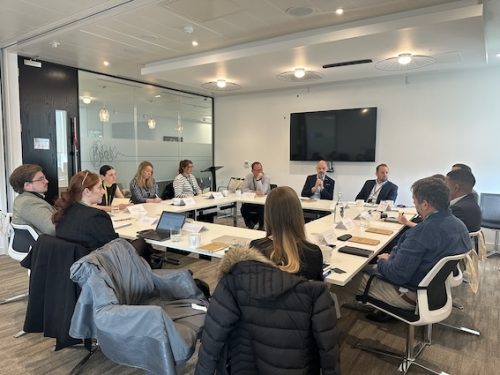Round table report: strategies for growth amid uncertainty

In a dynamic and ever-changing economic landscape, the West Midlands Business of the Year Awards 2024, brought together regional business leaders at Freeth’s Birmingham office to discuss the secrets behind their exceptional growth and stability.
Winners and shortlisted companies joined to discuss the strategies that are driving their success.

As the region and the UK brace for upcoming general elections and potential shifts in administration, these businesses are navigating uncertainty with innovation.
This period has felt different for Dale Parmenter, CEO of DRPG who said he is “old enough to have lived through several recessions and downturns and it was easier in those times. You could get an angle on what’s going on.
“Confidence is the biggest thing for us and we were not confident through COVID. But 2023 was a record year with record profits and we pulled back that productivity. Coming into this year – it’s mirroring last year, but the uncertainty is still there.
“We’ve been cautious. We’ve done two acquisitions that have taken 12 months. We know we’ve got to push out and we’ve got to invest, but we’ve been very cautious and very nervous. Customers love last-minute requests, so we can be pushing out tenders and quotes and then nothing. It can be weeks and months, and then all of a sudden they say I’d like it next week”.
The market has caused a rise in companies collapsing into administration, and whilst funding is available and there’s a desire to collaborate – the importance of due diligence in this inflationary market has become even more important.

He said: “We work with registered providers, and housing associations on various sites and by the nature of business, a lot of those sites have brownfield regeneration sites
“The market that we work in is shrinking – they’re nervous, their programmes are filling up as they’re getting to the end of the Homes England grant cycle and there’s a lot of our competitors becoming insolvent.
“We’re working on growing our partnerships as providers need someone who is financially stable and we believe we are”.
Through this period of uncertainty, shortlisted companies and winners at TheBusinessDesk.com’s Business of the Year Awards 2024 have turned the trend by diversifying, adapting and collaborating to boost profitability.
Vail Williams, a commercial real estate agency, had a record year thanks to offering a one-stop-shop for clients.
For Carole Taylor, partner at the firm, her attention is now on the secondary and tertiary market, where there’s a lot of stock that needs to be refurbished.
She said: “There’s been a flight to quality, whether that’s an office space or whether it’s in the industrial and warehousing space. But clients are always looking to save wherever they can.
“With embedded carbon, we know our existing buildings need to be upgraded rather than just pulling them down and starting again. There are office developers and investors that are looking at ways of refurbishing and it creates a whole new market”.
Thanks to the region’s prime location to reach the rest of the UK, there is a serious shortage of industrial units of quality for SMEs in particular.
Dr Adrian Steele, managing director of Mercian Labels, whose manufacturing is based in Burntwood, says the profitability and availability of those units “is severely limited. And it stops a lot of businesses from growing because they don’t have that sort of progression from starting a unit up and moving through.
“A lot of those units are too big, so we’ve got a lot of really poor quality in commercial and industrial units”.
With three major elections in one period, Dr Steele said a challenge for the business is that legislation for chemical labelling formats has all been postponed.
“They just can’t get it through in time, so a lot of people have been very reserved on the same issue. I think confidence is building, I’m certainly seeing that in the marketplace, but are we just going into a post-recession market growth”.
Businesses are still struggling to recruit, was the overall message across the discussion, but leaders say they are less focused on the qualifications a candidate has. Instead, they look for the tenacity and desire of an individual, someone they can help nurture through the ranks.
Henrietta Brealey, CEO of the Greater Birmingham Chamber of Commerce said: “Last quarter 72% of businesses that attempted to recruit experienced recruitment difficulties. This latest quarter for the first time it’s dropped down to 63%. That’s still high compared to where we were pre-pandemic, but it’s starting to come down gradually.
“Hospitality has been one of the hardest hit with all of the increased costs coming their way and being unable to pass those costs on to their clients. Those jumps in supplier costs are a challenge but hopefully its not getting worse”.
Craig Hinde, origination director at LDC has said the tech sector is one of the “hardest areas to recruit and probably demanding the biggest wage increase.
“A lot of these roles are fully remote so the London biases aren’t there. We saw with Tech Week that the Midlands has a thriving tech sector which is set to grow. As an investor, its music to our ears that there’s a push to transition the economy here to more tech-based roles and tech-based businesses”.
Mark Martin, director of ONE Creative Environments says there’s been a shift in people’s desire to go to university.
He said: “People are looking to the employer to take them through their qualifications. When doing this you do need to get your contractual side tied up so you’re able to retain the talent after they’ve finished their qualifications.
“You can’t find the talent out there and at the level that you want to, you have to nurture younger talent”.
For the CEO of Niyaa People, Dalvinder Shoker says to remain competitive the recruitment firm does a benchmarking exercise on every salary each year.
He found out that he was underpaying his leadership team, without realising and this can happen in many companies.
He said: “We had a client that lost their whole their gas team and my job is to make sure they’re paying people what is appropriate. The exercise found that they were paying their staff significantly less.
“We’ve also put several members of staff through qualifications and when I’ve found that that great talent I’ll say you can go on whatever courses you want to go on”.
Housebuilder Keon Homes has recruited not just off a candidate’s skills, but their attitude.
Matt Beckley said: “We are very flexible about what we pay, it’s very much based on that person’s skills and ability, mindset, all the rest of it. But some people are just far too unrealistic. When I say realistic, it’s not in terms of the salary – but about the value that they would have added to the business and the expectations for the salary that they wanted.
“We ended up recruiting somebody who’s far more junior with a cracking attitude. We work with them, we’ll put them through the Tara Academy, put them through uni and invest in somebody that way”.
Another way businesses have had to remain competitive is by offering hybrid and flexible working arrangements, but this comes with a level of frustration at wanting staff together to collaborate.
At ONE Creative Environments office, “the car parking wars are back” as staff return.
Mark Martin said: “My clients come through the door and they can’t believe the amount of people in the office.
“There was an assumption that working from home is great for everyone and for us our business carried on so we didn’t have to furlough anyone.
“But for many of our younger staff, they could have poor accommodation back home, easily get disrupted or share a rented flat with someone. So the young people really appreciated coming back into the office and now the senior people are also finding ways that include childcare and have all those other lifestyle benefits”.
One Black Bear has said the issues with transport have made this transition back to the office a lot harder.
Jon Harrison discussed how “prices are going up, people don’t want to drive in or pay for parking or the congestion charge.
“Trains let people down all the time – we see a mass exodus if whispers go around the office that they’ve cancelled trains.
“We always believed that being a city centre business was a big strength of ours – now I’m not sure”.
As the UK prepares for potential political changes, The West Midlands Businesses of the Year have remained committed to being more sustainable and investing in their talent.
Despite a tumultuous few years, each business highlighted the resilience and adaptability of the region, in navigating an uncertain economic environment.









